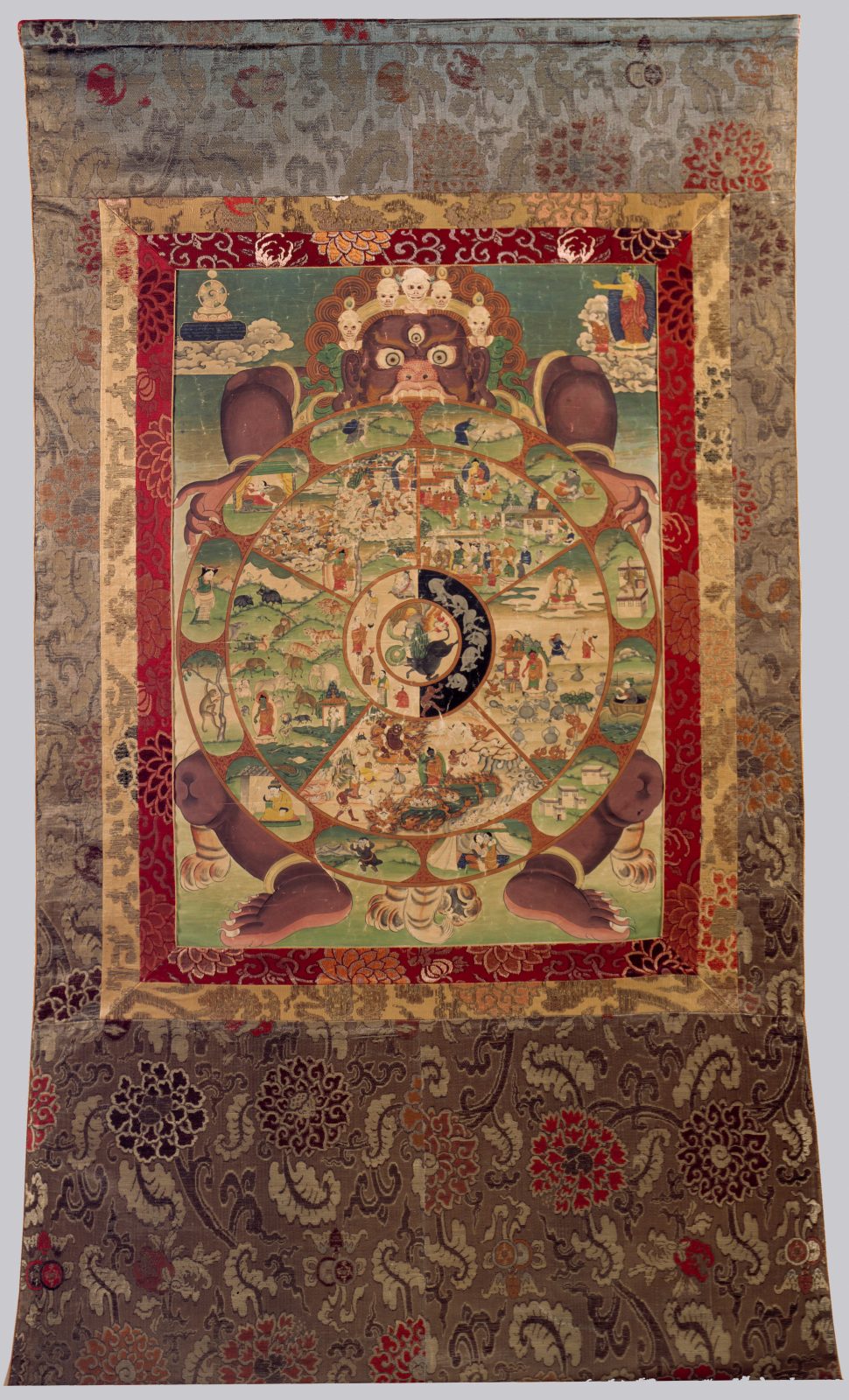
Wheel of Life, attributed to Lhadripa Rinzing Chungyalpa (b.1912, Sikkim - d.1977); Sikkim; c. 1930; Pigments on cloth; Rubin Museum of Himalayan Art; C2004.21.1

Wheel of Life, attributed to Lhadripa Rinzing Chungyalpa (b.1912, Sikkim - d.1977); Sikkim; c. 1930; Pigments on cloth; Rubin Museum of Himalayan Art; C2004.21.1
One of the most important teaching tools of Tibetan Buddhism is the Wheel of Life. Its image demonstrates the cyclical process of life, death, and rebirth, and how the actions you take in this lifetime affect your next life—an age-old “infographic” of Karma and other Buddhist concepts.
Beyond its traditional spiritual teachings, the Wheel of Life can also provide lessons for everyday citizens facing a changing world.


According to certain Buddhist traditions, the two worst realms to be reborn into are the aptly named hell realm, and the realm of hungry ghosts. The hell realm, as its name suggests, is similar to the Judeo-Christian ideas of a frightening place filled with fire, red-hot pokers, and monsters eating your face.
The realm of hungry ghosts is a different kind of unpleasantness. Existing in this realm is easy to imagine if you’ve heard the Greek story of Tantalus. People reborn into the realm of hungry ghosts have malformed bodies with huge, ravenous bellies, forever hungry and thirsty, but with necks too narrow to accept food or water.
These realms seem fantastical in their awfulness, but consider them reflections of real-world problems such as droughts and food shortages. Just as depictions of these realms on the Wheel of Life warn Buddhists of the consequences of immoral actions, they can serve as a reminder to all of us of the destruction that global climate change can bring about.

The animal realm may seem like a tempting rebirth, especially if you have ever had the fantasy of soaring like an eagle or frolicking in the waves like a dolphin. But the day-to-day life of a wild animal—however majestic—involves a fair amount of eat-or-be-eaten and there is little time and inclination for seeking spiritual enlightenment. Also, since invertebrates make up about 95% percent of all animal life on Earth, there’s a much higher chance of being reborn as a spineless worm than as a soaring eagle.
Being reborn as an animal is especially frightening in a world dominated by humans. Animals have little power to influence the larger world around them and are often the first to feel the effects of human development and environmental destruction.

The heavenly realm is composed of gods and demigods—the good life, right? Eating ambrosia, eternal youth, every wish fulfilled. The gods live in beautiful palaces and have no cares. But this sweet life is also extremely dangerous to the spirit—the gods have little incentive to help others or enlighten themselves, because they live in ultimate comfort and luxury. The gods are isolated from real life and can struggle to understand the suffering of others. So when they die, and yes, gods can die, they risk a truly terrible series of rebirths—hell, hungry ghost, tapeworm, foot fungus, etc.—for all of the time they wasted.
Sound familiar? In many ways, our own world is filled with short-sighted citizens and leaders that have mismanaged their resources. The Wheel of Life reminds us not to grow complacent or ignorant of the suffering around us when we have the ability to change the world for the better.

For all the difficulties and imperfections of being human, Buddhists believe it is the most auspicious birth (as well as one of the rarest) because humans have the time and intelligence to seek enlightenment. Human life is not the pleasure trap of godhood, or the daily struggle of animal life, and thankfully is not the tortured existence of the realms of hell and hungry ghosts. Humans have the capacity for change and are uniquely situated to transform their situations.
One of the simplest yet most compelling ideas the Wheel of Life offers to present-day challenges like global climate change is the concept of rebirth. Whether we are reborn to this world ourselves, or if we are brought back through the lives of our children and families—we do not want to be left with a poisoned planet. If we do not make positive changes, all of the realms could become like the hell realm and the realm of hungry ghosts in terms of terrible temperatures, shortages of food and water, and suffering. In this life, right now, we still have the power to make good choices and influence the outcome of this life and the next.
Get the latest news and stories from the Rubin, plus occasional information on how to support our work.